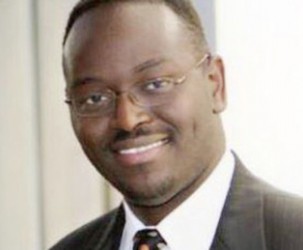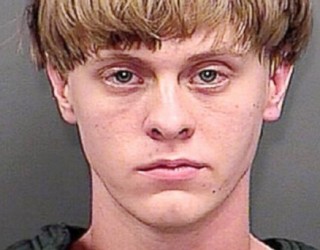CHARLESTON, S.C., (Reuters) – A young white man suspected of shooting nine black people dead after spending an hour with them in Bible study at a historic African-American church in South Carolina was arrested yesterday, a day after a massacre authorities say was motivated by racial hatred.
The mass shooting set off an intense 14-hour manhunt that ended with 21-year-old Dylann Roof arrested in a traffic stop in a small North Carolina town, 220 miles (350 km) north of Charleston, where the church rampage occurred, officials said.

Roof, who received a gun for a 21st birthday present in April and whose social media profile suggests a fascination with white supremacy, waived his right to extradition and was flown back to South Carolina hours after his arrest.
He is due for a bail hearing today but will appear by video link from the Charleston-area detention center where he was jailed, said Major Eric Watson, a Charleston County Sheriff’s Office spokes-man.
Wednesday’s gun violence at the nearly 200-year-old Emanuel African Methodist Episcopal Church caps a year of turmoil and protests over race relations, law enforcement and criminal justice in the United States, stemming from a string of police slayings of unarmed black men.
Four pastors, including Democratic state Senator Clementa Pinckney, 41, were among the six women and three men shot dead at the church nicknamed “Mother Emanuel,” which was burned to the ground in the late 1820s after a slave revolt led by one of its founders and was later rebuilt.
The gunshot victims ranged in age from 87 to 26. Three others who were present survived the rampage unscathed, including a 5-year-old who, according to CNN, avoided being shot by playing dead.
“The fact that this took place in a black church obviously raises questions about a dark part of our history,” said U.S. President Barack Obama. “Once again, innocent people were killed in part because someone who wanted to inflict harm had no trouble getting their hands on a gun.”
The United States has been shaken by a string of mass shootings in recent years, including the 2012 massacre at Sandy Hook Elementary School, where a gunman killed 20 children and six adults. But Democratic-led efforts to tighten the nation’s gun laws failed after that incident.

Little was immediately known about Roof following his arrest. A man who identified himself as Carson Cowles, Roof’s uncle, told Reuters that Roof’s father had recently given him a .45-caliber handgun as a birthday present and that Roof had seemed adrift.
“I don’t have any words for it,” Cowles, 56, said in a telephone interview. “Nobody in my family had seen anything like this coming.”
In a Facebook profile apparently belonging to Roof, a portrait showed him wearing a jacket emblazoned with the flags of apartheid-era South Africa and of the former Rhodesia, now Zimbabwe, both formerly ruled by white minorities. Many of his Facebook friends were black.
Court documents show Roof was arrested on two separate occasions at a shopping mall earlier this year for a drug offense and trespassing. And two school districts where he attended high school have no records of him ever graduating.
His mother, Amy, declined to comment when reached by phone.
“We will be doing no interviews, ever,” she said before hanging up.
The suspect was carrying a handgun when confronted by police who pulled him over in North Carolina after a report that he had been sighted there, but Roof surrendered peacefully as he was taken into custody, said Charleston Police Chief Greg Mullen.
Police said Wednesday night’s shooting unfolded about an hour after Roof joined a small Bible-study group in the church, welcomed apparently as the only white participant, and suddenly opened fire on the victims as they sat together.
Sylvia Johnson, a cousin of Pinckney, told MSNBC that a survivor told her the gunman reloaded five times during the attack despite pleas for him to stop.
“He just said, ‘I have to do it. You rape our women and you’re taking over our country,’” Johnson said.
U.S. Attorney General Loretta Lynch said her office was investigating whether to charge Roof with a hate crime motivated by racial or other prejudice.
Under federal and some state laws, such crimes typically carry harsher penalties. But South Carolina, which has the death penalty, is one of just five U.S. states lacking hate crime laws.
RISING RACIAL TENSIONS
The shooting rampage marks one of the most notorious attacks on a black church in the South since the 1963 bombing of the 16th Street Baptist Church in Birmingham, Alabama, which killed four young girls and helped galvanize the U.S. civil rights movement. The bombing was tied to the Ku Klux Klan.
The bloodshed in Charleston follows a new wave of racial tensions and protests stirred by recent police killings of unarmed black men in cities across the country, including New York City, Baltimore and Ferguson, Missouri.
In one such case in neighboring North Charleston, a white police officer was charged with murder after he shot Walter Scott, an unarmed black man, in the back.
The Southern Poverty Law Center, which researches U.S. hate groups, said the latest church attack illustrates the dangers that home-grown extremists still pose.
“Since 9/11, our country has been fixated on the threat of Jihadi terrorism. But the horrific tragedy at the Emanuel AME reminds us that the threat of homegrown domestic terrorism is very real,” the group said in a statement, referring to the Sept. 11, 2001 attacks on the United States.
There have been 4,120 reported hate crimes across the United States, including 56 murders, since 2003, the center said.
In addition to the church’s leader, Pinckney, other victims included three pastors – DePayne Middleton Doctor, 49; Sharonda Coleman Singleton, 45; and Reverend Daniel Simmons, 74. Also killed were Cynthia Hurd, 54, a public library employee; Susie Jackson, 87; Ethel Lance, 70; Tywanza Sanders, 26; and Myra Thompson 59, an associate pastor at the church, according to the county coroner.
As night fell yesterday, mourners returned to the Emanuel AME Church for a vigil, placing candles outside the building next to a growing memorial of flowers, plush toys, balloons and placards. A woman played “Amazing Grace” on the bagpipes across the street.




